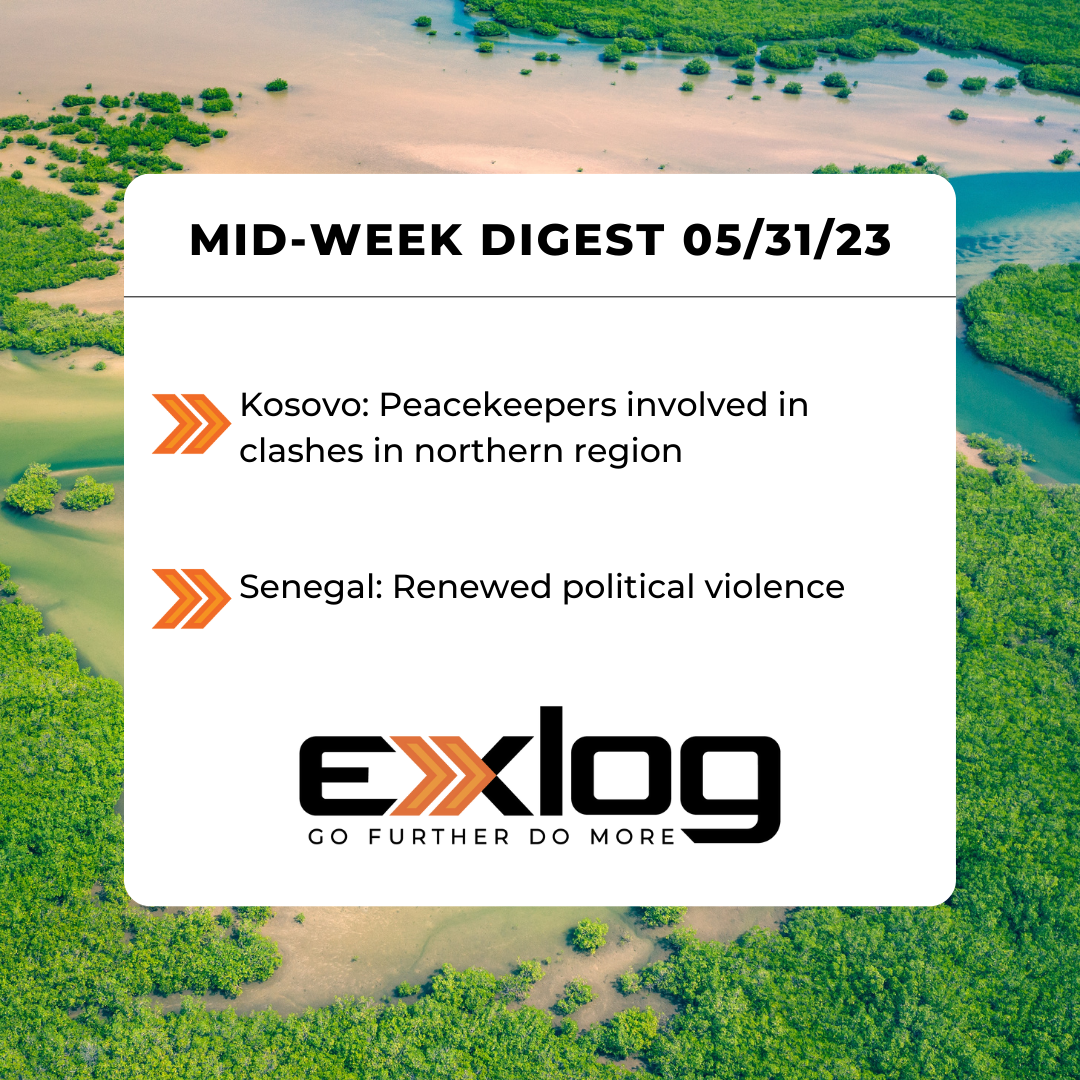Peacekeepers involved in northern Kosovo clashes and renewed political violence in Senegal
Kosovo: Ethnic Serbs clash with peacekeepers in northern region
Tensions between ethnic Serbs and authorities in northern Kosovo have escalated to violent clashes with peacekeeping forces, causing dozens of injuries. On May 26, protesters in three northern municipalities attempted to block the installation of ethnic Albanian mayors elected in a recent vote that was overwhelmingly boycotted by the region’s ethnic Serbian majority. Kosovar police forces forcibly secured the town halls, removed Serbian flags, and attempted to disperse protesters with tear gas. In response, Serbian President Aleksandar Vučić placed his military on its highest alert status and moved troops to the border with Kosovo on May 27. At the same time, NATO’s Kosovo Force (KFOR) peacekeeping mission sent troops to the three towns to restore order. Ethnic Serbs clashed with KFOR peacekeepers on May 29 in Zvečan while trying to enter the town hall, injuring 52 ethnic Serbs and 30 KFOR soldiers. The protestors were observed using improvised explosive incendiary devices, batons, and firearms. NATO has since declared that 700 additional troops will be deployed to Kosovo, joining the 3,800 already in the country. As of May 31, Kosovo’s largest party of ethnic Serbs pledged to continue protesting until their demands to withdraw the Kosovar Albanian mayors and police are met. These clashes arose from the April 2023 local elections boycotted by ethnic Serbs, which allowed ethnic Albanians to take control of local councils in Kosovo’s Serbian-majority north with a voter turnout of less than 4%. The impacted municipalities have historically been governed by local councils backed by Serbia, as Serbs and their allies refuse to acknowledge Kosovo’s sovereignty. Critics have described the attempted forcible installation of the new mayors as provocative and claim that it violates a 2013 agreement regarding local self-governance. Despite backing Kosovo’s independence from Serbia in 2008, the US and EU have also condemned Kosovo’s handling of the recent unrest and canceled its participation in a NATO exercise occurring this week. Meanwhile, Kosovo Prime Minister Albin Kurti has blamed the violence on provocations by the Serbian government. The potential for further violence remains elevated so long as the Kosovo government maintains its inflexible approach to managing the local security situation and the political grievances of the ethnic Serbian majority in the region remain unresolved.
Senegal: Unrest flares ahead of verdict in trial of opposition leader
Disruptive and violent incidents of political unrest remain likely in the Senegalese capital of Dakar in the days ahead pending the verdict of a criminal court case involving Ousmane Sonko, the leader of the opposition PASTEF-Patriots party. Sporadic clashes have been reported since March 26, when Sonko and crowds of supporters set off from his hometown of Ziguinchor (situated in southwestern Senegal) in a “freedom caravan” bound for Dakar. Authorities have repeatedly cracked down on participants in the unauthorized procession; at least one person was killed in a skirmish in Kolda (located less than 200 km from the caravan’s point of departure) on March 26. Unrest escalated in Dakar on March 29, a day after Senegalese authorities disbanded the caravan and forcibly escorted Sonko to the capital. Urged to “come out onto the streets,” Sonko’s supporters blocked roadways and carried out arson attacks targeting gas stations, the homes of various politicians, public buses, and private vehicles; police dispersed the crowds with teargas. Authorities have increased security in the capital in response to the unrest, with measures such as a ban on the circulation of motorcycles likely to remain in effect through at least June 1 – the date when local media report that a criminal court will hand down its verdict in the latest trial involving Sonko, who stands accused of rape and libel. If convicted, he could be barred from running for president in elections planned for February 2024. Sonko and his supporters claim that the legal case against him is politically motivated, and developments in the case since 2021 have repeatedly triggered episodes of violent political unrest including several incidents since the beginning of this year. The ruling Benno Bokk Yakaar coalition has strongly criticized the recent unrest and called for a mass public “rally for the Republic” in central Dakar on June 3. Despite likely high security surrounding the demonstration, it may be a flashpoint for confrontations between rival groups of political supporters, especially if Sonko is convicted and disqualified from participating in next year’s election.


